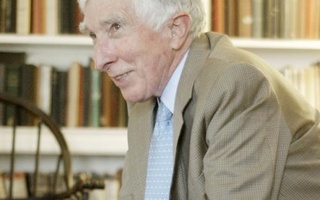
Renowned author John H. Updike ’54 spoke yesterday at First Parish Church as part of Harvard Book Store’s speaker series.
Harvard’s Houghton Library announced earlier this week that it will acquire the John Updike Archive—an extensive collection of Updike’s original manuscripts, correspondence, photographs, and files, including documents that the author had kept private.
Updike ’54, a Pulitzer Prize-winning author, died in January.
“It’s hard to imagine 20th century literature without thinking of Updike as a major part of it,” said Leslie A. Morris, the curator of modern books and manuscripts at Houghton Library.
The Library had previously acquired a part of Updike’s records, when he gave Harvard several manuscripts before the 1970s, when a tax law changed that prohibited tax deductions for donations of personal archives, according to Morris.
After the change in tax law, Updike continued to deposit his personal archives and work at the Houghton Library, though Updike maintained full control over access to these documents.
According to Morris, he allowed researchers access to his work for purposes of literary criticism, but he wanted his personal correspondence kept private.
“This collection will enable teaching and research that will not just enrich our understanding of a distinguished writer and his work, but will also provide insights into the literary craft and its place in late 20th century America,” Harvard University President Drew G. Faust said in a statement.
Updike indicated in his will that he wanted the remainder of his archive to go to Harvard, though the University had to pay an undisclosed amount of money to Updike’s literary trust to complete the acquisition.
Rodney G. Dennis, Morris’s predecessor, first approached Updike about the future of his archive over 40 years ago, and Updike began depositing his work at Harvard shortly thereafter.
“[Updike] was a scholarship kid and I think Harvard was a very different place from where he had grown up,” Morris said. “He appreciated the opportunities he had here.”
After moving to New York for about two years after graduating, Updike returned to Massachusetts to live just an hour away from Harvard Yard until he died, according to Morris.
Updike gave lectures and printed some of his poems at Harvard. He carried a Harvard Library card until his death.
Morris said some of the more unexpected materials include Updike’s childhood work, including a copy of a short story he had submitted to the New Yorker with the rejection slip attached to the front.
Updike originally hoped to be a cartoonist and pursued the interest as president of the Harvard Lampoon. Some of his self-portraits from this time reveal “a move private side of Updike that hasn’t been seen before,” Morris said.
Houghton Library may hire additional staff and experts to assist in the sorting and cataloguing process, which Morris said is slated to take up to two years. After the process is finished, students and researchers will have full access to the new materials.
Read more in News
Bombay Club Leaves SquareRecommended Articles
-
Bestsellers in The SquareThe following is a compilation of best sellers reported by Barnes & Noble, the Harvard Cooperative Society, the Paperback Booksmith
-
 Updike Delves Into ‘Terrorist’ Mindset
Updike Delves Into ‘Terrorist’ Mindset -
What’s Up with UpdikeSome advice for aspiring writers: if you anticipate your work being purchased en masse one day by the Houghton Library, ...
-
 Portrait of an Artist: Jon Morris
Portrait of an Artist: Jon Morris -
Who will win the World Series?There is a palpable buzz in Boston this week surrounding the World Series, which will feature the hometown Boston Red Sox versus the St. Louis Cardinals. Here on campus, it’s not hard to guess who we’ll be cheering for. But statistically speaking, which team has the higher chance of winning? FM decided to talk to Carl N. Morris, statistics professor and sports analysis guru.
-
 Harvard Men's Basketball's 38% Chance
Harvard Men's Basketball's 38% Chance













